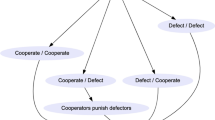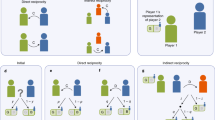Abstract
We offer a theoretical explanation of negative reciprocity or vengeance, i.e., the human desire to harm those who have harmed us. Our model shows how negative reciprocity can be sustained by the coevolution1 of genes that determine the capacity for vengeance and group memes (e.g., social norms) that regulate its expression. The model begins with a standard free-rider game that captures, simply and directly, a personal cost incurred to reap social gains. The model shows that a taste for vengeance realigns incentives and supports a socially efficient equilibrium, but that by itself the taste for vengeance is not evolutionarily viable. We then show how groups of individuals can use low-power sanctions (or simply status changes) to enforce a particular norm on the proper degree of vengeance. The main result is that actual behavior will typically fall short of the norm, but selection across groups will adjust the norm so that actual behavior maximizes the fitness of group members.
See Dawkins (1976), Boyd and Richerson (1985), and Durham (1991).
Access this chapter
Tax calculation will be finalised at checkout
Purchases are for personal use only
Preview
Unable to display preview. Download preview PDF.
Similar content being viewed by others
References
Axelrod R (1986) An evolutionary approach to norms. Am Polit Sci Rev 80: 1095–1111
Blackmore S (1999) The meme machine. Oxford University Press, Oxford
Bolton GE, Ockenfels A (1999) ERC: a theory of equity, reciprocity and fairness. Smeal College of Business Administration, Pennsylvania State University, http://silmaril.smeal.psu.edu:80/lems/ERC.pdf
Boyd R, Richerson PJ (1985) Culture and the evolutionary process. University of Chicago Press, Chicago
Boyd R, Richerson PJ (1992) Punishment allows the evolution of cooperation (or anything else) in sizable groups. Ethol Sociobiol 13: 171–195
Boyd R, Richerson PJ (1998) The evolution of human ultra-sociality. In: Eibl-Eibisfeldt I, Salter FK (eds) Indoctrinability, ideology and warfare: evolutionary perspectives. Berghahn, New York
Brownlow A, Gullapalli R, Hoskins B, Ross M (2000) Game theory: introducing vengeance—a laboratory experiment. UC Santa Cruz, Master’s class term project
Dawkins R (1976) The selfish gene. Oxford University Press, New York
Dawkins R (1982) The extended phenotype: the gene as the unit of selection. Freeman, San Francisco
Durham WH (1991) Coevolution: genes, culture, and human diversity. Stanford University Press, Stanford
Falk A, Fehr E, Fischbacher U (1999) On the nature of fair behavior. Institute for Empirical Economic Research, University of Zurich, http://www.unizh./iew/wp
Fehr E, Gaechter S (1999) Cooperation and punishment in public goods experiments. Institute for Empirical Economic Research, University of Zurich, http://www.unizh.ch/iew/wp
Fehr E, Schmidt K (1999) A theory of fairness, competition, and cooperation. Q J Econ 114: 817–868
Frank R (1988) Passions within reason: the strategic role of the emotions. Norton, New York
Friedman D, Singh N (1999) On the viability of vengeance. UC Santa Cruz Working Paper, http://zzyx.ucsc.edu/Econ/workpapers.html
Hagen WW (1999) The Balkans’ lethal nationalisms. Foreign Aff 78: 52–64
Huck S, Oechssler J (1999) The indirect evolutionary approach to explaining fair allocations. Games Econ Behav 28:13–24
Kelly R (1985) The Nuer conquest: the structure and development of an expansionist system. University of Michigan Press, Ann Arbor
Levine DK (1998) Modeling altruism and spitefulness in experiments. Rev Econ Dyn 1: 593–622
Levine DN (1965) Wax and gold: tradition and innovation in Ethiopian culture. University of Chicago Press, Chicago
MacDonald KB (1994)A people that shall dwell alone: Judaism as a group evolutionary strategy. Praeger, Westport
Nowak MA, Sigmund K (1998) Evolution of indirect reciprocity by image scoring. Nature 393: 573–577
Sethi R, Somanathan E (1996) The evolution of social norms in common property resource use. Am Econ Rev 86: 766–788
Sober E, Wilson DS (1998) Onto others: the evolution and psychology of unselfish behavior. Harvard University Press, Cambridge
Wilson EO (1975) Sociobiology: the new synthesis. Belknap Press of Harvard University Press, Cambridge
Author information
Authors and Affiliations
Editor information
Editors and Affiliations
Rights and permissions
Copyright information
© 2001 Springer Japan
About this paper
Cite this paper
Friedman, D., Singh, N. (2001). Evolution and Negative Reciprocity. In: Aruka, Y. (eds) Evolutionary Controversies in Economics. Springer, Tokyo. https://doi.org/10.1007/978-4-431-67903-5_8
Download citation
DOI: https://doi.org/10.1007/978-4-431-67903-5_8
Publisher Name: Springer, Tokyo
Print ISBN: 978-4-431-67994-3
Online ISBN: 978-4-431-67903-5
eBook Packages: Springer Book Archive




